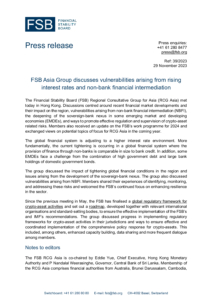Press enquiries:
+41 61 280 8477
[email protected]
Ref: 10/2024
The Financial Stability Board (FSB) Regional Consultative Group for Asia (RCG Asia) met today in Colombo.
Members discussed recent financial market developments and vulnerabilities that warranted closer monitoring. Members also received an update on the FSB’s work programme and discussed how they could contribute to the FSB’s emerging market and developing economies-focused work. The group discussed ways to promote the implementation of FSB regulatory framework for crypto-asset activities across the region and recent developments in artificial intelligence, its growing use in the financial sector, and implications for financial stability.
Members reviewed progress being made within the region on addressing financial risks from climate change. This year, the FSB will focus on deepening its analysis of climate-related financial risks to financial stability and examining the relevance of transition plans for financial stability. Members discussed their work in supervising climate-related financial risks and how transition planning was feeding into this work.
Members also discussed progress on enhancing cross-border payments and the key challenges in making them faster, cheaper, and more transparent and inclusive. The FSB’s work under the G20 Roadmap has moved to a new phase focused on implementation and includes efforts to strengthen engagement with the private sector.1 The group discussed initiatives being undertaken in their jurisdictions and within the region to address current frictions in cross-border payments, including technological innovations. The group also exchanged views on areas where greater private- and public-sector collaboration could be of most benefit in the region.
Notes to editors
The FSB RCG Asia is co-chaired by Eddie Yue, Chief Executive, Hong Kong Monetary Authority and P Nandalal Weerasinghe, Governor, Central Bank of Sri Lanka. Membership of the RCG Asia comprises financial authorities from Australia, Brunei Darussalam, Cambodia, China, Hong Kong SAR, India, Indonesia, Japan, Korea, Malaysia, New Zealand, Pakistan, Philippines, Singapore, Sri Lanka, Thailand and Vietnam.
The FSB has six Regional Consultative Groups, established under the FSB Charter, to bring together financial authorities from FSB member and non-member countries to exchange views on vulnerabilities affecting financial systems and on initiatives to promote financial stability.2 Typically, each Regional Consultative Group meets twice each year.
The FSB coordinates at the international level the work of national financial authorities and international standard-setting bodies and develops and promotes the implementation of effective regulatory, supervisory, and other financial sector policies in the interest of financial stability. It brings together national authorities responsible for financial stability in 24 countries and jurisdictions, international financial institutions, sector-specific international groupings of regulators and supervisors, and committees of central bank experts. The FSB also conducts outreach with approximately 70 other jurisdictions through its six Regional Consultative Groups.
The FSB is chaired by Klaas Knot, President of De Nederlandsche Bank. The FSB Secretariat is located in Basel, Switzerland and hosted by the Bank for International Settlements.
- See FSB (2023), G20 Roadmap for Enhancing Cross-border Payments: Priority actions for achieving the G20 targets, February. [←]
- The FSB Regional Consultative Groups cover the following regions: Americas, Asia, Commonwealth of Independent States, Europe, Middle East and North Africa, and sub-Saharan Africa. [←]
